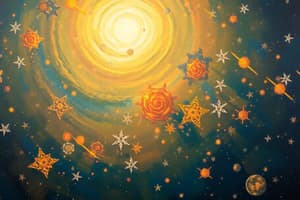Podcast
Questions and Answers
What is the process by which elements are formed within stars as a result of nuclear fusion?
What is the process by which elements are formed within stars as a result of nuclear fusion?
- Nuclear Fission
- Stellar Nucleosynthesis (correct)
- Alpha Ladder Process
- Triple Alpha Process
What is the name for a vast cloud of gas and dust in space, such as the one captured by the James Webb Telescope?
What is the name for a vast cloud of gas and dust in space, such as the one captured by the James Webb Telescope?
- Heavy Light Stellar
- Nuclear Fusion Nebula
- Carina Nebula (correct)
- Protostar
At what stage in the formation of a star does the protostar represent?
At what stage in the formation of a star does the protostar represent?
- Main Sequence Stage
- Early Stage Before Nucleosynthesis (correct)
- Red Giant Stage
- Nucleosynthesis Stage
What is the process that involves the fusion of three Helium-4 atoms and leads to the formation of Beryllium-8?
What is the process that involves the fusion of three Helium-4 atoms and leads to the formation of Beryllium-8?
During which stage of stellar evolution are elements heavier than iron formed?
During which stage of stellar evolution are elements heavier than iron formed?
What did Henry Moseley prove about elements?
What did Henry Moseley prove about elements?
Which historical figure discovered the neutron?
Which historical figure discovered the neutron?
What is the Big Bang Theory?
What is the Big Bang Theory?
What were the very first elements formed in the universe according to the text?
What were the very first elements formed in the universe according to the text?
What are protons and neutrons?
What are protons and neutrons?
What is nucleosynthesis?
What is nucleosynthesis?
Flashcards are hidden until you start studying
Study Notes
Stellar Formation and Nuclear Fusion
- Elements are formed in stars through nuclear fusion, where lighter nuclei combine to form heavier nuclei.
- This process occurs in the core of stars, under extreme temperatures and pressures, leading to the release of energy.
Cosmic Clouds
- A vast cloud of gas and dust in space is known as a nebula, which can be captured by telescopes like the James Webb Telescope.
Stages of Star Creation
- A protostar is the initial stage in star formation, representing a dense region in a nebula where matter begins to collect and heat.
Helium Fusion
- The fusion of three Helium-4 atoms generates Beryllium-8 in a process known as the triple-alpha process, essential for stellar nucleosynthesis.
Stellar Evolution
- Elements heavier than iron are formed during the supernova stage of stellar evolution, where explosive nucleosynthesis occurs.
Moseley's Contribution
- Henry Moseley established that the atomic number, rather than atomic mass, is the defining property of an element, leading to a better understanding of the periodic table.
Discovery of the Neutron
- The neutron was discovered by physicist James Chadwick in 1932, providing insights into atomic structure and nuclear reactions.
Big Bang Theory
- The Big Bang Theory posits that the universe originated from a singularity and has been expanding ever since, explaining the current cosmic microwave background radiation.
Early Universe Elements
- The first elements formed in the universe were hydrogen and helium, primarily produced during the first few minutes post-Big Bang through nucleosynthesis.
Protons and Neutrons
- Protons are positively charged particles found in atomic nuclei, while neutrons are neutral particles that also reside in nuclei, together defining an atom's atomic mass.
Nucleosynthesis
- Nucleosynthesis refers to the process in which new atomic nuclei are created from pre-existing nucleons (protons and neutrons), occurring in stars and during the early universe.
Studying That Suits You
Use AI to generate personalized quizzes and flashcards to suit your learning preferences.




